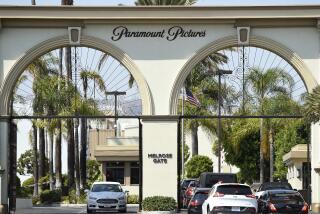Harrah’s agrees to $17.1-billion buyout bid
- Share via
The newest players in Las Vegas plunked down $17.1 billion on the Strip on Tuesday, as two private equity firms agreed to buy Harrah’s Entertainment Inc., the world’s largest casino company.
In Las Vegas, the new owners will acquire Harrah’s holdings, which include Harrah’s, Barbary Coast Hotel and Casino, Bally’s, Flamingo, Paris and Imperial Palace -- giving it a 350-acre stretch along the Strip.
The highly anticipated sale to Apollo Management and Texas Pacific Group was one of several major acquisitions of gaming outfits by private investment firms. The purchasers also agreed to assume $10.7 billion in debt.
It probably will be one of the top 10 private equity buyouts of 2006 -- a year of record-setting acquisitions by private investors. Others have included the $21-billion buyout of hospital operator HCA Inc. and the $20-billion buyout of Equity Office Properties Trust.
Harrah’s Chief Financial Officer Jonathan S. Halkyard said the management team was likely to stay in place as well as the company’s ambitious plans for continued growth on the Strip and around the world.
“We really see this as a change in the ownership structure of the corporation, and not a change in strategy,” Halkyard said.
The new owners issued a statement expressing confidence in Harrah’s management’s plans for the future.
The $90-a-share deal would end a takeover saga set in motion more than two months ago, when Las Vegas-based Harrah’s said Apollo and Texas Pacific had initially offered $81 a share.
Harrah’s operates more than 40 casinos in 13 states, including Harrah’s, Caesars and Horseshoe. The company also owns the rights to the World Series of Poker -- the super bowl of the gaming world.
But in Las Vegas, Harrah’s casinos have been overshadowed by glitzier new properties such as Wynn Las Vegas and the Venetian.
“They spent two to three years trying to deal with the very high end of the market, but they finally just gave up on it,” said economics professor Bill Eadington, director of the Institute for the Study of Gambling at the University of Nevada at Reno.
Discussions with a special committee began last week, after the deadline set by Harrah’s board for offers. The casino giant also reportedly received an $87-a-share bid from Penn National Gaming Inc., a Wyomissing, Pa.-based race track and casino operator.
Although the private equity firms and casino company had agreed on the price last week, the parties haggled through the weekend.
Private equity has found its way into gaming before, initiated by Colony Capital’s $420-million acquisition of Harveys Casino Resorts in 1998. In 2004, the firm then bought the Las Vegas Hilton for $280 million. Other private-equity companies with gaming holdings include Oaktree Capital Management and Bay Harbour Management.
Although some have speculated that the Harrah’s deal would spur further acquisitions by private equity firms of casinos, industry regulations hinder sales of gaming institutions.
Foremost among the difficulties are state licensing regulations. At Harrah’s, thousands of high-level employees have gone through license approval, which includes a background check and character investigation.
Lloyd D. Levenson, of law firm Cooper Levenson, said he has handled dozens of ownership transfers for casino companies and the process varies greatly.
“There is a lot of discretion involved in negotiations with regulators on who has to file and who doesn’t,” said Levenson, who has Harrah’s as a client although not on the buyout deal.
It is likely to take a year for Apollo and Texas Pacific to obtain the gaming regulatory approvals before the deal formally closes, Halkyard of Harrah’s said.
By building gaming venues that cater to Middle America, Harrah’s has a diverse line of establishments from coast to coast, including a management contract for an Indian casino near Temecula and several properties on the shores of Atlantic City, N.J.
Founded in 1937, Harrah’s grew from a small bingo parlor opened by South Pasadena-born William F. Harrah. Working with his father, Harrah began acquiring casinos and clubs in Reno and the rest of Nevada.
Focusing on nickel and dime slot machine players, the company opened casinos around the country. It went public in 1971, and by Harrah’s death in 1978, it was grossing $100 million.
In 1980, Holiday Inn acquired Harrah’s with the hope of making gaming palaces as ubiquitous as roadside motels.
In recent years, Harrah’s has steadily been accumulating other businesses, including rival Caesars Entertainment Inc. for $9.4 billion in 2005, which made it the largest casino company in the world, bigger than the recently merged MGM Mirage/Mandalay company.
In September, Harrah’s made a $531.8-million offer for London Clubs International, which would be the company’s first entrance in Britain’s casino market. The board unanimously recommended that shareholders accept the bid.
Times staff writer Kimi Yoshino contributed to this report.
*
(BEGIN TEXT OF INFOBOX)
Harrah’s Entertainment Inc.
Founded: 1937, by William F. Harrah
Headquarters: Las Vegas
Employees: 85,000
Chief executive: Gary W. Loveman
Properties: More than 40 casinos under such names as Harrah’s, Rio, Caesars, Bally’s, Horseshoe and Showboat
Locations: 13 states, Canada and Uruguay. Sites include Las Vegas, Reno, Laughlin, Nev., Lake Tahoe, Atlantic City, N.J., New Orleans, Phoenix and San Diego County.
2005 revenue: $7.1 billion
Market capitalization: $15.3 billion
--
Source: Times research
More to Read
Inside the business of entertainment
The Wide Shot brings you news, analysis and insights on everything from streaming wars to production — and what it all means for the future.
You may occasionally receive promotional content from the Los Angeles Times.









